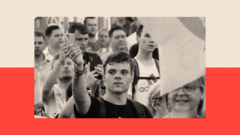This article delves into the socio-political factors contributing to the attraction of far-right ideologies, with voices from supporters and academic insights into broader trends in gender and political orientation.
**The Rise of Far-Right Sentiments Among Young Men in Germany**

**The Rise of Far-Right Sentiments Among Young Men in Germany**
An exploration into the increasing appeal of the Alternative für Deutschland (AfD) party amongst German youth, primarily young men.
Young men in Germany are increasingly gravitating towards the far-right Alternative für Deutschland (AfD) party as it has been polling in a position of strength going into the national election. This trend can be attributed to factors including heightened concerns about immigration, perceptions of societal safety, and a growing disconnection from traditional political narratives.
Nineteen-year-old Nick, an AfD supporter, voiced a desire for a Germany free of the fear he associates with current immigration levels, reflecting sentiments shared amongst many young men in the region. Their opposition largely stems from recent violence involving asylum seekers but notably does not extend to all forms of immigration.
Support for right-wing ideologies among young men is notable, with recent research indicating that 26% of German men have favorable views on the AfD, compared to just 11% of women. This divide appears to stem from differing priorities, with men more inclined to focus on conservative values amidst rising anxiety about the socio-political climate.
The influence of social media plays a critical role in the rise of the AfD, with the party emerging as a dominant force on platforms like TikTok, where traditional media narratives are perceived to be hostile. This digital presence aids in normalizing far-right perspectives, further attracting young males who feel disconnected from dominant left-leaning discourses that often emphasize issues like feminism and minority rights.
For figures like Celina Brychcy, a 25-year-old influencer promoting AfD ideals on TikTok, the motivation stems from a sense of genuine belief in AfD's core propositions, such as stricter border control. Brychcy faces challenges, including social isolation due to her views, yet remains steadfast in her commitment to the party, asserting that she does not reject multiculturalism outright.
The allure of the far-right is further complicated by a cultural backlash against gender roles, with some young men security in traditional male identities feeling threatened by changing societal expectations. Meanwhile, women express concerns over potential regression in gender rights, indicating a significant generational divide regarding political issues.
Amid this evolving landscape, it’s noteworthy that while the AfD's support aligns with persistent frustrations towards mainstream parties, their appeal transcends mere protest support. As the party solidifies its presence, experts predict potential integration of far-right perspectives into the broader political dialogue, raising questions about the future trajectory of Germany’s political landscape.
Nineteen-year-old Nick, an AfD supporter, voiced a desire for a Germany free of the fear he associates with current immigration levels, reflecting sentiments shared amongst many young men in the region. Their opposition largely stems from recent violence involving asylum seekers but notably does not extend to all forms of immigration.
Support for right-wing ideologies among young men is notable, with recent research indicating that 26% of German men have favorable views on the AfD, compared to just 11% of women. This divide appears to stem from differing priorities, with men more inclined to focus on conservative values amidst rising anxiety about the socio-political climate.
The influence of social media plays a critical role in the rise of the AfD, with the party emerging as a dominant force on platforms like TikTok, where traditional media narratives are perceived to be hostile. This digital presence aids in normalizing far-right perspectives, further attracting young males who feel disconnected from dominant left-leaning discourses that often emphasize issues like feminism and minority rights.
For figures like Celina Brychcy, a 25-year-old influencer promoting AfD ideals on TikTok, the motivation stems from a sense of genuine belief in AfD's core propositions, such as stricter border control. Brychcy faces challenges, including social isolation due to her views, yet remains steadfast in her commitment to the party, asserting that she does not reject multiculturalism outright.
The allure of the far-right is further complicated by a cultural backlash against gender roles, with some young men security in traditional male identities feeling threatened by changing societal expectations. Meanwhile, women express concerns over potential regression in gender rights, indicating a significant generational divide regarding political issues.
Amid this evolving landscape, it’s noteworthy that while the AfD's support aligns with persistent frustrations towards mainstream parties, their appeal transcends mere protest support. As the party solidifies its presence, experts predict potential integration of far-right perspectives into the broader political dialogue, raising questions about the future trajectory of Germany’s political landscape.



















